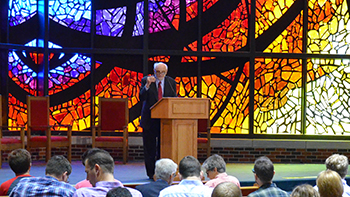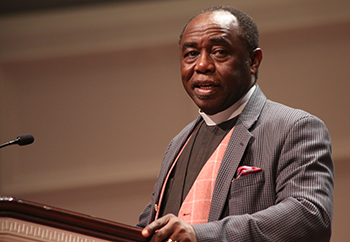Faith is vital to Christian higher education, BGCT university leaders say
WACO—Faith is a crucial factor in Christian higher education, both for students and for the leaders who guide them, presidents of Texas Baptist universities reported.
Leaders of four of the Baptist General Convention of Texas’ nine affiliated universities participated in a panel discussion, “The Future of Christian Higher Education,” during the BGCT’s annual meeting in Waco, Nov. 14.
Need for spiritual formation
One of the great challenges the schools face is the poor status of spiritual formation among their students, said Eric Bruntmyer, president of Hardin-Simmons University in Abilene.
“Students are not coming prepared spiritually,” Bruntmyer lamented. “We have a responsibility to our students to transform them from being a church-goer to walking with Christ—every day, all day long.”
Pointing to a similar issue, Adam Wright, president of Dallas Baptist University, cited the philosophical challenge of “dealing with students who will reject the very leadership they crave.”
Living with differences
Many students also carry the spiritual challenge of polarization to their campuses, Wright added, noting the schools must “help students understand just because someone is far-left or far-right, they don’t have to hate or reject them.” This pattern illustrates the need for cultivating Christian peacemakers, he added.
Similarly, Bobby Hall, president of Wayland Baptist University, whose historic residential campus is located in Plainview, noted his school conducted a year-long emphasis on “civility in the Christian context” and is following up with an emphasis on “be the solution.”
Faith must be cultivated
Spiritual formation and faithful preparation are not exclusively issues of concern for students, the presidents said, noting these issues present daily challenges for the presidents themselves.
“Knowing and discerning God’s will is the greatest challenge,” said Blair Blackburn, president of East Texas Baptist University in Marshall. Each day, he must seek to understand “what God wants us to do as a university” and follow the Spirit of God, he added.
The presidents’ spiritual conditions are so vital “because people are watching us,” he acknowledged.
“Faith has to be cultivated every day,” Wright said. “Faith precedes and conditions one’s understanding. … If I truly believe what I say I believe, it will shape everything I do.”
Relying on the Bible
Studying and meditating on Scripture every day helps Bruntmyer face challenges, he explained.
“There’s a lot of fear I have about the future—about higher education, about my kids. … That crawls right up on your back,” he acknowledged, adding Scripture keeps fear at bay.
Pondering the Bible’s messages of hope and prayer provide the only way to endure, Bruntmyer said, noting, “I don’t know how people make it without talking to God every day.”
“We wrap our actions and strategies in prayer,” Hall agreed. “We must go to the Lord and seek that discernment. … We know who wins at the end of the day.”
Practical challenges faced
In addition to spiritual issues, the presidents cited several practical challenges Texas Baptist universities face. They include:
• Affordability.
This is the greatest strategic challenge, Blackburn said. “Students are coming to our campuses with hands out, expecting their education to be paid for, (coming) from families who have not prepared very well for paying for higher education.”
This issue is compounded by “the national conversation questioning if higher education is worth it,” Hall added.
The schools are working hard to make higher education affordable, Bruntmyer said, noting they try to deliver education efficiently, cutting costs where possible.
Several schools offer block tuition, so students can take additional courses at a fixed cost. They also try to guide students to take accelerated courses and graduate in fewer than four years, Blackburn said.
The presidents pushed back on advice against taking out student loans.
Bruntmyer compared a $20,000 loan—“less than the cost of a car”—to the additional earning potential of $600,000 to $900,000 that a college degree delivers. He says refusing to take a college loan is ridiculous and assures students, “You can afford it.”
Hall noted 40 percent of students do not buy textbooks and said Wayland is working on a “textbook solution.”
Wright reported DBU Chancellor Gary Cook is trying to raise $100 million for scholarships, and other presidents said adding scholarships is a priority.
Blackburn thanked the BGCT for providing funds to enable ministry students to afford higher education.
• First-generation students.
Wayland educates many students who are the first individuals in their families to seek higher education, Hall said. Other presidents agreed convincing first-generation students to seek a college degree and convincing their families the degree is worth the cost is vital.
• Student mindset.
Disrespect for authority, feelings of entitlement and an attitude of “consumer demand” also are challenges, Blackburn said.
• Religious freedom.
Challenges to religious freedom are huge, Hall reported. He noted, for example, the cost of compliance to federal regulations places a strain on campus budgets.
The central factor in the universities’ religious freedom is Title IX, the federal law that seeks to protect students from discrimination on the basis of sex. The typical flash points are campus response to sexual abuse, as well as potential for discrimination based upon sexual orientation.
The Title IX “train has left the station, and it is not going to change with the change of (presidential) administration,” Blackburn said. “We have a responsibility to be prepared for acceptance. We have a responsibility to stand for God’s truth, but to share an education with students who choose to come to our campuses.”
Baptist and other faith-based schools have received some Title IX exemptions, he said, noting, for example, ETBU will not offer dorms that house both sexes.
Universities must focus on protecting their female students, but they also must teach male students the danger of pornography and how to respect women, Bruntmyer said.
“The tendrils of (Title IX) go to every aspect of our universities,” Hall said. “We’re seeing it at every turn, where faith-based institutions are threatened.” The threat is not simply regarding beliefs but also finances—cost of compliance and threat of removing tax-exempt status, he added.
Still, Title IX provides Texas Baptist universities with an opportunity, Wright said.
“The world is watching to see how we respond,” he said. “We’re taking the truth of Scripture to a hurting world.”
In addition to the four universities represented on the panel, the other BGCT-affiliated universities are Baptist University of the Américas, Baylor University, Houston Baptist University, Howard Payne University and the University of Mary Hardin-Baylor.
Editor’s note: This article has been updated to correct a typographical error in the sixth-to-last paragraph.
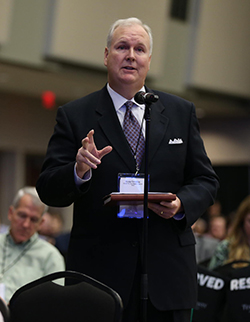
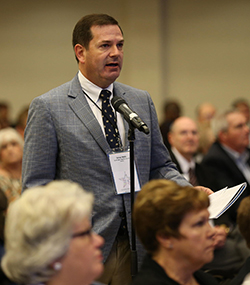
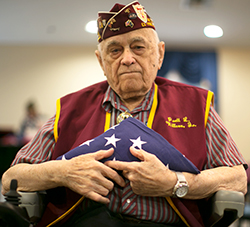

 Donnell, executive director and founder of Warriors Circle and a member of the Sisseton Wahpeton Oyate tribe, said Georgia Risenhoover, a sixth-generation descendent of Chief War Eagle, was instrumental in his introduction to Texas Baptists..
Donnell, executive director and founder of Warriors Circle and a member of the Sisseton Wahpeton Oyate tribe, said Georgia Risenhoover, a sixth-generation descendent of Chief War Eagle, was instrumental in his introduction to Texas Baptists..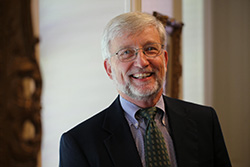
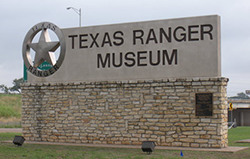 The morning after Baylor announced formation of the task force, a crowd filled Knox Hall at the Texas Ranger Museum in Waco for an event launching Bears for Leadership Reform.
The morning after Baylor announced formation of the task force, a crowd filled Knox Hall at the Texas Ranger Museum in Waco for an event launching Bears for Leadership Reform.